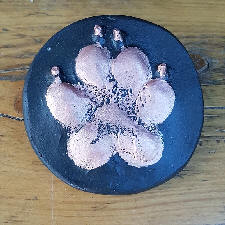Pet Bereavement
|
|
|
|
Dealing with the death of a beloved dog...
|
|
|
What is known about any type of grief is that we can move through a range of different emotions in no particular order.
Shock and numbness
Yearning and searching
Despair and disorganisation
Reorganisation and recovery
J. Bowlby and C. Parkes (1961)
|
The only cure for
grief is to grieve
(Grollman,
2017) The unconditional, non-judgemental and accepting relationship we receive from our dogs can sometimes offer a relationship which may be lacking from our human companions. So, why would we not feel the same depth of grief with our dogs as we would with our fellow human beings? Sadly, society also tells us it is not acceptable to grieve so deeply for our canine companions. I came across the term 'disenfranchised grief' during my training and it is a word which I believe is equally relevant in the area of animal bereavement. It means a grief which is not acknowledged by society i.e. we shouldn't be grieving so much for a dog or there is a time limit on the grief we have for our dogs. This disparity can lead to feelings of confusion. Additionally, our own pre-conceived ideas about grieving for an animal can cause us to become stuck and self-critical. What is important to know is that it is absolutely normal and natural to feel grief with the death of our dog in much the same way as when we lose a human loved one and, like any grieving process, there is no time limit! |
Bill at Rainbow Bridge David had been 'best friends' with a dog Ė not with a human being. 'What,' she wondered, 'did it say about someone who could relate to a dog on a deeper level that with a fellow human being?'' 'Bill had been a great dog,' she admitted, 'but a dog nonetheless. And she didnít think it was natural or even proper, to mourn the loss of an animal with the same intensity one would mourn the passing of a human being.' David continued to tell another story about Bill. And as he did, he found himself smiling. David was smiling he realised, because he felt that Bill was somehow nearer...' (Carrison, 2010) |
The agility community is a strong one and overall it is a place where we can find the comfort, understanding and acceptance we may need. As a group, we are able to empathise and generally accept the range of emotions experienced by our peers. This can be of huge benefit when we grieve at the death of our dogs. The support and understanding of our fellow agility colleagues can go a long way to helping us process this grief in a healthy way.
 Some
things you can do...
Some
things you can do...
As fellow dog agility enthusiasts, there are some things we can do to
both help ourselves and our friends when going through the grieving process.
Acknowledge the
grief. A condolence card, email or some form of communication to signify
recognition over the importance of this death.
Many individuals may
turn to friends and/or family for support at this very painful time. Be
sure to keep in touch with friends who are grieving. Isolation when grieving
can be hard. This may be one of the most important things you can do as a
friend or relation. Avoid talk of replacing a dog. Some may be able to move
on quickly to another dog whilst others need time, possibly years to think
about taking on another puppy/dog. Remember our grieving process as well as
our personal circumstances are totally individual. Donít assume what someone
needs!
It helps to talk!
Talking can help us to process the grief and start the healing process. Talk
with friends, family or an experienced counsellor. It is important to
realise that there is no set way to grieve. Your way of processing grief is
individual to you!
Look after yourself!
Grieving can be exhausting. Make sure you get plenty of sleep and give
yourself the time and space you need to grieve. Try to keep to a routine and
make sure you are still eating healthily and exercising.
Many people have
found memorialising a pet to have been a great source of comfort. There are
many different ways this can be done from planting a tree, keeping a memento
such as a piece of jewellery, plaque, a website memorial page and/or a
charity walk and so the list goes on.
The Blue Cross offers Pet Bereavement Support which provides trained volunteers who offer a 'listening ear' whilst you are going through this traumatic experience. https://www.bluecross.org.uk/pet-bereavement-and-pet-loss
Be aware there is no set specific time for grief, be it days, months or years. Just as in the grief over the death over a much-loved human relation or companion, grieving is a natural process. We can, however, get stuck at a certain point of the grieving process.
If you feel the intensity of your feelings are not lessening or your ability to take on regular tasks has become increasingly difficult, these may be signs which indicate professional help is required. To find a counsellor in your area, The Counselling-Directory provides a list of professionally qualified counsellors. https://www.counselling-directory.org.uk/.
I would like to thank my friend and colleague Sue Byrne MBACP (Accred.), BA (Hons) Counselling for her contributions to this article. Sue is a Clinical Supervisor and Equine Assisted Therapist.
 References
References
Bowlby, J. & Parkes, C. (1970) Processes of Mourning. International Journal of Psychoanalysis, 42, 317-339.
Carrison, D. (2010) Bill at Rainbow Bridge. Modern Family Classics Publishing.
Doka, K. (1989) Disenfranchised grief: Recognising hidden sorrow. Lexington, MA: Lexington Press.
Grollman, E. (2017) Grief Quote. Grief Poetry, Word Press.com
 About
the author...
About
the author...
Emma-Jane LaRoche MBACP BA (Hons) has been taking part in dog agility for
over 18 years and has also run her own agility club.
She set up a pet care business 15 years ago but has taken a back seat with her husband now running the business full time since she began practicing as a counsellor in 2012.
Emma-Jane has a private practice in Guildford, Surrey and runs pet bereavement workshops for both professionals and those wanting to understand more about pet bereavement. Alongside this, she practices Animal Assisted Therapy which also includes dog agility.
Tel: 01483 338151 email 141counselling@gmail.com web site: https://www.141counselling.com
First published 11th August 2018
|
[bottom.htm] © Copyright Agilitynet |